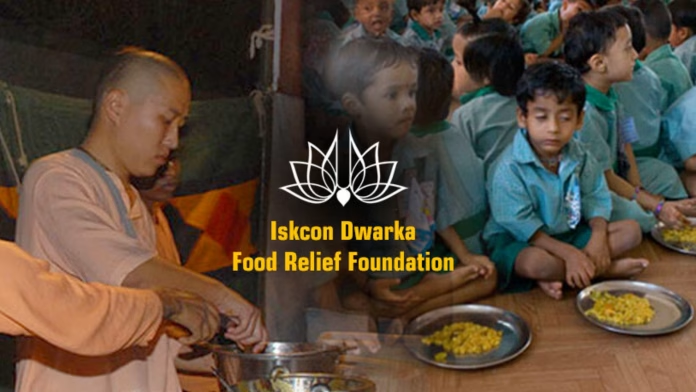The International Society for Krishna Consciousness (ISKCON), also known as the Hare Krishna movement, was founded in 1966 by A.C. Bhaktivedanta Swami Prabhupada. One of the core principles of this movement is to practice bhakti yoga, which involves devotion to Lord Krishna through chanting, meditation, and selfless service. The ISKCON Food Relief Foundation (IFRF) is a branch of the organization that focuses on providing nutritious and free meals to people in need around the world. In this article, we will explore the history, mission, and impact of the IFRF.
The IFRF was established in India in 1974 by the ISKCON community as a response to the widespread poverty and malnutrition in the country. The first kitchen was set up in the slums of Mumbai, where volunteers prepared and served hot meals to local residents. The initiative quickly gained popularity, and more kitchens were set up in other parts of the country. In 1994, the IFRF expanded its operations to other parts of the world, starting with the United States. Today, the foundation has a presence in more than 60 countries, serving over 1.8 million meals daily through various programs.
The IFRF’s primary mission is to provide nutritious and free meals to people in need, regardless of their social, economic, or religious backgrounds. The foundation believes that food is a basic human right and should be accessible to everyone. They aim to provide meals that are not only filling but also nutritious, as malnutrition is a significant concern in many parts of the world. The IFRF also places a strong emphasis on sustainability and environmental responsibility. They strive to use locally sourced ingredients and eco-friendly practices to minimize their carbon footprint and promote a more sustainable future.
Programs of IFRF
The IFRF has several programs through which they provide meals to those in need. Some of these programs are:
Akshaya Patra: This is the flagship program of the IFRF, which provides mid-day meals to school children in India. The program was launched in 2000 and has since expanded to serve more than 1.8 million children in 19,039 schools across 12 states in India. The meals provided by Akshaya Patra are not only nutritious but also help encourage children to attend school regularly.
Food for Life: This program provides free meals to people in need around the world, regardless of their social, economic, or religious backgrounds. The program has a presence in more than 60 countries, serving over 1.8 million meals daily. Food for Life also responds to emergencies such as natural disasters and provides food relief to affected communities. Annamrita: This program provides mid-day meals to school children in India, with a focus on promoting hygiene and nutrition. The program currently serves over 1.2 million meals daily in more than20,000 schools across India.
Impact of IFRF:
The IFRF’s programs have had a significant impact on the lives of millions of people around the world. By providing nutritious and free meals, the foundation has helped alleviate hunger, malnutrition, and food insecurity, especially among vulnerable populations such as children, the elderly, and the homeless.
The Akshaya Patra program has also had a positive impact on education, as children who receive regular meals are more likely to attend school regularly and perform better academically. The program has also helped reduce the dropout rate in schools, especially among girls.
Moreover, the IFRF’s focus on sustainability and environmental responsibility has helped promote eco-friendly practices and reduce their carbon footprint. By sourcing locally and using eco-friendly practices, the foundation has also helped support local communities and promote sustainable development.
The IFRF’s work is a shining example of how a community can come together to address some of the most pressing challenges facing our world today.




